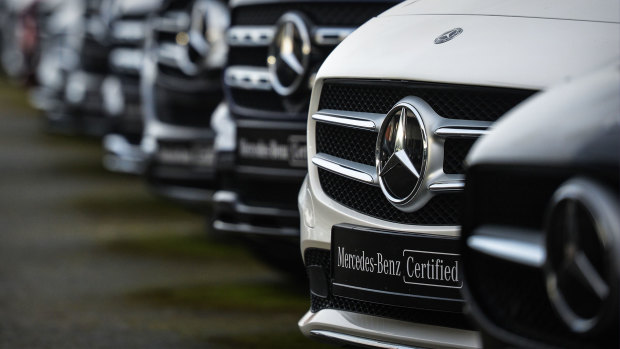
Hey, at least Mercedes had a good quarter on the electric-vehicle front.
The EV sector recently has been on the wrong end of the bad-news cycle. Cox Automotive had said in a report that the U.S. electric-vehicle market has hit “critical mass, outpacing average days’ supply of gasoline vehicles at dealerships.”
The number of EVs on dealer lots has more than quadrupled to 92,000 this year, Cox data show. That's roughly a 92-day supply.
Fossil-fuel vehicles, on the other hand, are averaging 54 days in inventory as supply-chain delays are easing. That’s significantly shorter than the average inventory supply time of 70 days.
In addition, the Biden administration took some hits from both auto executives and union officials over its ambitious plans for the electric vehicle market.
The Environmental Protection Agency in April proposed rules that could result in as much as two-thirds of the new-vehicle market shifting to EVs by 2032.
In response, the Alliance for Automotive Innovation, which represents General Motors (GM) -), Stellantis (STLA) -), Toyota (TM) -), and others, called the EPA proposal a "de facto battery electric vehicle mandate" that was "neither reasonable nor achievable."
So with all this ill will floating around, it wouldn't hurt to hear some positive news about the EV sector, would it?
EV Sales Tell a Different Story
And that's where Mercedes-Benz USA comes in.
The Mercedes-Benz Group-owned distributor for passenger cars in the U.S. released its second-quarter sales figures on July 11, reporting 77,287 cars sold, down 2.3% from a year ago.
Including commercial vans, the total came to 96,019, down 2.8% year-over-year.
But EV sales were a different story. Mercedes said that Q2 electric vehicle sales rose by 608% from the year-ago quarter, to 11,927 units. EV sales totaled 19,268 units for the first half.
The company's EV lineup makes up 15% of overall passenger-vehicle sales in the quarter.
Mercedes-Benz USA said it had introduced EVs in its lineup, including the EQS sedan, the EQS luxury SUV, the EQB full-size SUV, the EQE sedan and the EQE midsize SUV.
"We are very encouraged by the exponential demand of our electric vehicle lineup and top-end offerings. Especially, the EQS SUV and EQE SUV, both proudly manufactured in Alabama, continue to advance our electric offensive and welcome new customers to the Mercedes-Benz brand," Dimitris Psillakis, president and chief executive of Mercedes-Benz USA, said in a statement,
Meanwhile, Mercedes-Benz Group (DDAIF) -) said sales in the second quarter rose 6% year-on-year - a total of 515,700 vehicles, thanks to strong demand for all-electric and top-end vehicles.
'Remaining Disciplined'
Sales grew in all the carmaker's main regions -- Europe, Asia and North America -- with deliveries in Germany up 23%, while China was up by 12% and the U.S. by 6%.
In the rest of the world, second-quarter sales fell 12% to 20,700 vehicles.
Mercedes-Benz passenger battery electric car sales rose to 56,300 units, more than double (up 123%) the year-earlier figure. Sales were boosted by solid demand in Germany and the U.S. in particular.
"Mercedes-Benz continues to remain disciplined, even in a dynamic market environment," the company said.
Fully electric vehicles now account for 11% of overall sales year-to-date. Including plug-in hybrids, Mercedes-Benz sold 187,600 electrified vehicles, a 36% increase, corresponding to a global xEV-share of 18% at the end of June.
"The U.S. market continued its transformation towards electric cars with a rise in the share of Mercedes-Benz battery electric vehicles to 16% at the end of June, compared to 3% in the first half of last year," the automaker said.
Mercedes-Benz recently announced that customers in North America will gain access to Tesla’s (TSLA) -) supercharger network, which the company said was "another step towards accelerating the shift to electric vehicles."
Action Alerts PLUS offers expert portfolio guidance to help you make informed investing decisions. Sign up now.







